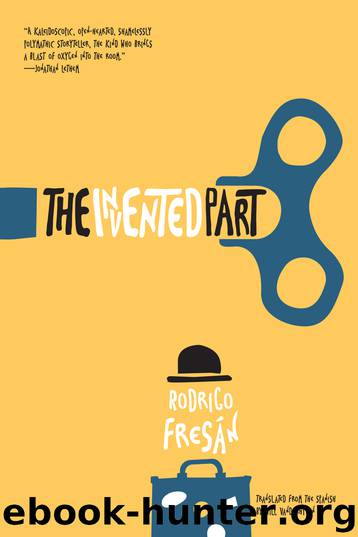The Invented Part by Rodrigo Fresán

Author:Rodrigo Fresán
Language: eng
Format: epub
ISBN: 9781940953571
Publisher: Open Letter
Published: 2017-02-03T16:00:00+00:00
MANY FÊTES, OR STUDY FOR A GROUP PORTRAIT WITH BROKEN DECALOGUES
† “Have you read all these books?” she asks.
† The biji is a genre of classic Chinese literature. “Biji” can be translated, roughly yet more or less faithfully, as “notebook.” And a biji can contain curious anecdotes, nearly blind quotations, random musings, philosophical speculations, private theories regarding intimate matters, criticism of other works, and anything that its owner and author deems appropriate. Do samurais interrupt the conversation of their katanas to write down something that occurs to them in the precise instant of blood and steel? Did geishas write bijis in the tight silk straps that they bound their feet with to keep them from growing? Ah, yes . . . A biji always at hand, just in case, you never know. A biji like the written and unplugged equivalent of one of those mobile phones used to photograph anything, everything, and nothing. The different items in a biji can be numbered, but, also, it’s possible to read them not according to any order, opening a path for ourselves, starting at any point and jumping back and forth or up and down or side to side. Beginning at the end and ending at the beginning. The idea is that, one way or another, each reader ends up discovering a story as unique as her reading. The biji genre appeared for the first time during the Wei and Jin dynasties, and reached full maturity during the Tang and Song dynasties. The biji of that period include, also and in an almost featured role, fragments of the “believe it or not” variety, anticipating the Believe It or Not! comic strip created by the supposed explorer and slightly mythomaniacal adventurer Robert Ripley, for the pages of a newspaper at the beginning of the twentieth century. So, many of the entries in the biji format can be thought of as little fictions detaching themselves from one great fiction, that, though secret, is there nonetheless, waiting to be discovered. (Please, don’t confuse a biji with one of those oh so hip—ever since the amusing dictatorship of one-hundred-forty characters installed itself—microstories. Those witticisms that everyone writes or tries to write and with which even he, once, tried to win—and lost, under a pseudonym—a contest. With the following: “Amnesia / Somewhere in La Mancha, somewhere I cannot remember.” And that is, and was, it.)
Now he, it’s not that he wants to, but that he can remember. And he arranges and unarranges these pages, telling and deluding himself that he’s revisiting the biji genre, so he doesn’t have to admit that they are, in reality, just the windblown tatters of fallen standards and the still-smoking ruins of something that he wanted to build but that came crashing down. The broken pieces of a temple he believed in or needed to believe in. The shrapnel from an explosion extracted, piece-by-piece, from the wounded but surviving body of something, of someone. The loose phrases of that thing—trying to swim underwater
Download
This site does not store any files on its server. We only index and link to content provided by other sites. Please contact the content providers to delete copyright contents if any and email us, we'll remove relevant links or contents immediately.
The Hating Game by Sally Thorne(19276)
The Universe of Us by Lang Leav(15077)
Sad Girls by Lang Leav(14423)
The Lover by Duras Marguerite(7903)
The Rosie Project by Graeme Simsion(6417)
Smoke & Mirrors by Michael Faudet(6192)
Big Little Lies by Liane Moriarty(5804)
The Poppy War by R. F. Kuang(5698)
The Shadow Of The Wind by Carlos Ruiz Zafón(5693)
An Echo of Things to Come by James Islington(4884)
Memories by Lang Leav(4800)
What Alice Forgot by Liane Moriarty(4634)
From Sand and Ash by Amy Harmon(4522)
The Poetry of Pablo Neruda by Pablo Neruda(4110)
The Tattooist of Auschwitz by Heather Morris(3848)
Ficciones by Jorge Luis Borges(3636)
The Rosie Effect by Graeme Simsion(3469)
Guild Hunters Novels 1-4 by Nalini Singh(3464)
THE ONE YOU CANNOT HAVE by Shenoy Preeti(3373)
